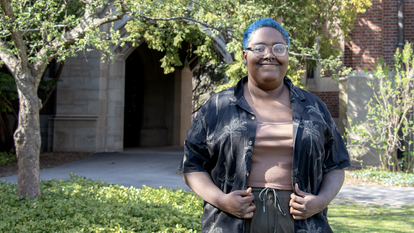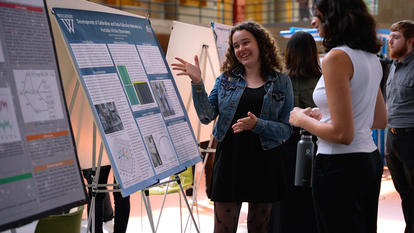
Wellesley Faculty Panelists Analyze the Election
“It takes time to count all the votes. It takes time for states to certify election results,” said Maneesh Arora, assistant professor of political science, at the start of a post-election discussion he moderated for the Wellesley community on November 4. “[W]e should understand that this is not due to any sort of fraud, it is just due to the usual process of going through and ensuring that every vote is counted.”
With the country still waiting to learn the voting results from a number of swing states, Danilo Contreras, assistant professor of political science; Chipo Dendere, assistant professor of Africana studies; Brenna Greer, associate professor of history; and Laura Grattan, Jane Bishop ’51 Associate Professor of Political Science, tackled questions about this historic election from Arora as well as attendees.
Dendere said she is always a bit optimistic about what American institutions can manage, despite their imperfections, and that the strategic push for early voting helped to ensure people from a variety of backgrounds would vote. “I’ve been talking to people in the Black community, in the African immigrant community,” she said, “and over and over, I keep hearing people saying, ‘Well, I voted two weeks ago,’ ‘I voted a week ago,’ ‘I sent in my ballot.’ And that is one way of protecting people against institutional barriers.” She noted that though the process needs improvement, “recognizing that the system was created to disenfranchise minority voters and figuring out how to work around that has been really important.”
When Arora asked about the role of race in this year’s election, Contreras suggested a need to move past the idea that Latinx voters are a “monolithic electoral bloc” that will help Democrats return to the White House. “Latinx voters are not single-issue voters, and immigration does not necessarily mobilize them as much as we thought it would,” he said. “I was particularly intrigued by the voting patterns of Latino men, and the extent to which, surprisingly, they helped defray President Trump’s loss of [support from] white, suburban women, so that was sort of an unexpected trend for me.”
“The idea that we’re now discussing Georgia and North Carolina and Arizona as potential Democratic states—it’s remarkable.”
Danilo Contreras, assistant professor of political science
Greer added that after Barack Obama was re-elected in 2012, many in the Republican Party thought they needed to become more inclusive. “Trump just flipped that on its head,” she said. “Instead, it became an issue of not having anyone tell you that you couldn’t think particular ways or couldn’t be racist. There’s just a real fear of a rising Black and brown population for many people, but also real pushback against having any freedoms that might be limited in the way of how you think, or how you have to interact with other people.”
Grattan added that with the enormous turnout, more people voted for Trump in 2020 than in 2016. “If this was a referendum on Trump, it wasn’t a referendum that went in the direction of equity and justice and generous values,” she said. She noted that resentment of and backlash against Obama, the gutting of the Voting Rights Act, and voter suppression were all issues that preceded Trump, but that he “offers this symbol of a kind of unabashed, unregulated, white masculinist power.” “I think that there’s a real sense of threat that many Americans feel to their space and their privilege,” she said, “and I think that seems to be something that Trump really taps into, and might help explain some of the increased turnout.”
When an attendee asked what they would say to Wellesley students whose home states may not have gone for the candidates they wanted, the panelists urged them to be engaged and remember that change takes time.
“Political organizers talk about politics as a space of moving between hope and despair,” Grattan said, “and it can be heartbreaking for all kinds of reasons.” She noted that the changes in states like Georgia and Arizona that have edged them into purple territory are due to years of work by organizers. “It doesn’t mean that our core conservative places are going to shift,” she said. “But that if you’re out there doing the work, if people that you love are out there doing this work, you can be proud of yourselves.”
“It’s important that you find victories even in defeat…electoral politics shift all the time,” Contreras added. “The idea that we’re now discussing Georgia and North Carolina and Arizona as potential Democratic states—it’s remarkable. So, play the long game. Be kind to yourself, and be optimistic.”



